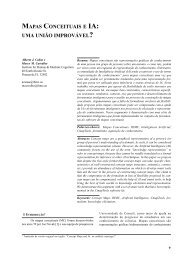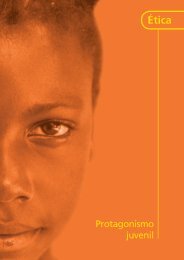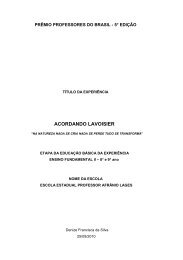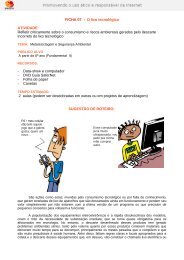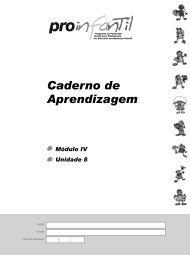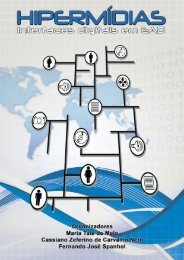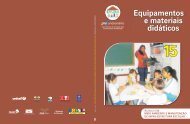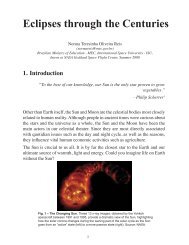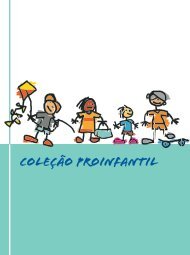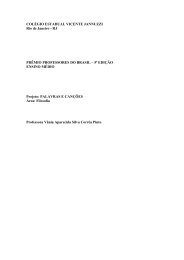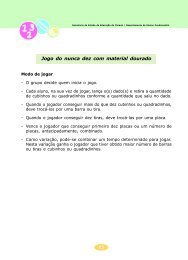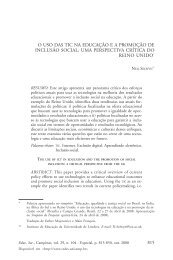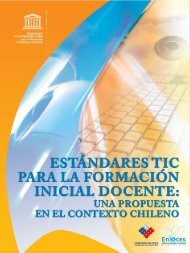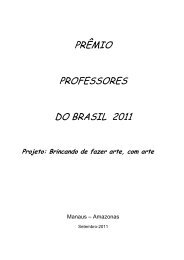BIO-CULTURAL COMMUNITY PROTOCOLS - Portal do Professor
BIO-CULTURAL COMMUNITY PROTOCOLS - Portal do Professor
BIO-CULTURAL COMMUNITY PROTOCOLS - Portal do Professor
Create successful ePaper yourself
Turn your PDF publications into a flip-book with our unique Google optimized e-Paper software.
CHAPTER 7<br />
Bio-cultural Jurisprudence<br />
Elan Abrell, 1<br />
Kabir Bavikatte & Harry Jonas<br />
1. Introduction<br />
This book is intended to further amplify the call from<br />
indigenous peoples and local communities (ILCs) to be<br />
affirmed within international and national legal frameworks<br />
as custodians of their landscapes and to enjoy secure rights<br />
to manage their territories, natural resources and traditional<br />
knowledge, innovations and practices (TK) according to their<br />
values and customary laws. In the preceding chapters we<br />
detail a variety of legal and policy frameworks such as the<br />
international regime on access and benefit sharing (IRABS),<br />
programme on reducing emissions from deforestation and<br />
forest degradation in developing countries (REDD), protected<br />
areas and payment for ecosystems services (PES) that are<br />
being developed with the aims of delivering environmental<br />
gains and securing social justice. Whilst acknowledging the<br />
importance of the regulatory frameworks, we also highlight<br />
the potential each has to further marginalize ILCs as custodians<br />
of their landscapes.<br />
Because the success of international regulatory frameworks<br />
of dealing with modern global concerns such as the<br />
appropriate use of TK, biodiversity loss or climate change<br />
depends on their careful implementation at the local<br />
level, ILCs are integral to the decision-making process<br />
relating to any of those activities. The local implementation<br />
of environmental legal frameworks is most likely to lead to<br />
environmental and social benefits when ILCs have the right<br />
of free, prior and informed consent (FPIC) over any activities<br />
that affect them. FPIC in this context also includes<br />
exercising the right to determine the types of use of their<br />
1. Elan Abrell, Associate, Natural Justice and Doctoral Student, Department of Anthropology, City University of New York.<br />
TK, land, territories and natural resources and to influence<br />
the details of any intended projects or activities.<br />
In this context, ILCs’ ability to articulate and assert their values,<br />
customary laws and practices becomes the indispensable<br />
condition for ensuring the local integrity of environmental law.<br />
This book focuses on use of bio-cultural community protocols<br />
(BCPs) by ILCs as one way in which communities can increase<br />
their capacity to drive the local implementation of international<br />
and national environmental laws, with reference to the IRABS,<br />
REDD, protected areas and PES. Whilst we argue that this is a<br />
practical and immediately available tool for ILCs to assert<br />
their right to self-determination, we acknowledge that a more<br />
radical paradigm shift is required within the law itself if ILCs<br />
are to be recognized as drivers of the conservation and<br />
sustainable use of biodiversity and the generation of<br />
culturally appropriate livelihoods. This chapter sketches a<br />
nascent form of legal thought, namely, bio-cultural<br />
jurisprudence that marks a movement in that direction. It<br />
explores FPIC’s twin foundations, namely, the right to selfdetermination<br />
and respect for customary laws and practices,<br />
and argues that bio-cultural jurisprudence places the values<br />
of ILCs at the heart of environmental law, initiating a radical<br />
rethink of the ‘facts’ of property jurisprudence that the<br />
law takes for granted.<br />
68



